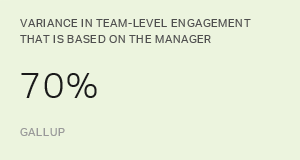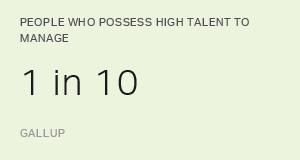Story Highlights
- Changing the way people work will improve global economic prosperity
- 70% of a team's engagement depends on the manager
- Companies need to change the way they think about management
Although many people are talking about the end of the recession and a post-recovery economy, the truth is that productivity in the U.S. and worldwide has remained stagnant for decades.
The conclusion of Gallup's No Recovery report found that real GDP per capita growth has slowed from highs of 3% in the 1960s to only 0.5% in 2016.
What does that kind of slow economic growth mean for individuals? One common standard for measuring prosperity is the belief that the lives of our children will be better than our own. For most people, it is a humble wish. They don't want to become millionaires; they just want to know they are "getting ahead" and that the future is bright for the next generation.
A 2.5% to 3% rate of growth in productivity will lead to a doubling of the standard of living within 30 years, in other words, in one generation. A 1% growth rate will take three generations to reach the same gains. And we are hardly meeting that standard if we accurately measure productivity.
As Gallup Senior Economist Jonathan Rothwell writes, "Using multifactor productivity, it is clear that no period since 1973 has approached the 1948 to 1973 period in terms of efficiency growth."
What Can We Do to Raise Productivity (and Prosperity)?
There are many explanations for our stagnant productivity. Some suggest it's due to a lack of major technological or scientific breakthroughs. Our own No Recovery report argues that certain sectors (education, housing and healthcare) have been consuming economic growth while not providing better outcomes.
Many people are working to increase productivity through digitization and globalization efforts, and through the optimization of natural resources and capital, both financial and human. Better transportation infrastructure and affordable housing would also help.
But these projects are complex and typically require large private and public capital investments.
What if there was a way to boost productivity that cost significantly less? Something that got to the heart of the problem in a direct and tangible way?
What if we could change the way people worked?
Old Boss vs. New Boss
When we think of the term "management," we think of control. For the past 30 to 40 years, that was the idea of management: controlling and supervising processes and people.
The manager was the senior, experienced person who knew how to do things right and how everything was supposed to fit together. Advancement by seniority made sense because experience mattered a great deal.
And yet today, when it comes to the biggest problems in business, the manager doesn't know the answer. Nobody knows the answer. There is no process.
Managers must hire people who are smarter than themselves and unleash them to do things nobody has ever done before. Managers are charged with creating things that don't yet exist. They can't simply copy their past experiences.
Even more so, customers and employees no longer sit still and accept what they are given -- which means managers must be more flexible and creative when it comes to problem-solving. Carrot-and-stick methods of motivation just don't work anymore, primarily because most routine work has been automated.
In short, the world has changed, but too many organizations still have a management philosophy from the days of the assembly line.
In his book Drive: The Surprising Truth About What Motivates Us, Daniel Pink identifies three key motivations:
- Autonomy
- Mastery
- Purpose
But these words rarely show up in job descriptions, recruitment material, performance reviews or annual meetings.
| The Past | The Future | ||||||||||||||||||||||||||||||||||||||||||||||||||||||||||||||||||||||||||||||||||||||||||||||||||
|---|---|---|---|---|---|---|---|---|---|---|---|---|---|---|---|---|---|---|---|---|---|---|---|---|---|---|---|---|---|---|---|---|---|---|---|---|---|---|---|---|---|---|---|---|---|---|---|---|---|---|---|---|---|---|---|---|---|---|---|---|---|---|---|---|---|---|---|---|---|---|---|---|---|---|---|---|---|---|---|---|---|---|---|---|---|---|---|---|---|---|---|---|---|---|---|---|---|---|---|
| My Paycheck | My Purpose | ||||||||||||||||||||||||||||||||||||||||||||||||||||||||||||||||||||||||||||||||||||||||||||||||||
| My Satisfaction | My Development | ||||||||||||||||||||||||||||||||||||||||||||||||||||||||||||||||||||||||||||||||||||||||||||||||||
| My Boss | My Coach | ||||||||||||||||||||||||||||||||||||||||||||||||||||||||||||||||||||||||||||||||||||||||||||||||||
| My Annual Review | My Ongoing Conversations | ||||||||||||||||||||||||||||||||||||||||||||||||||||||||||||||||||||||||||||||||||||||||||||||||||
| My Weaknesses | My Strengths | ||||||||||||||||||||||||||||||||||||||||||||||||||||||||||||||||||||||||||||||||||||||||||||||||||
| My Job | My Life | ||||||||||||||||||||||||||||||||||||||||||||||||||||||||||||||||||||||||||||||||||||||||||||||||||
| GALLUP | |||||||||||||||||||||||||||||||||||||||||||||||||||||||||||||||||||||||||||||||||||||||||||||||||||
The truth is that today's worker is motivated by much more than a paycheck and job security.
They are looking for meaningful work, genuine relationships and personal growth.
Many of these things -- like a sense of purpose -- can't be bundled into a perks and benefits package; they must be communicated and regularly reinforced by an engaging manager.
The Boss Effect
Gallup analytics finds that 70% of the variance in team-level engagement is based on the manager. This can be attributed to three factors:
- Employee perceptions of the manager
- The manager's level of engagement
- The manager's talents
A company can have the best performance management system in the world -- but it's the person in the manager's seat who matters.
You can have the best employee experience strategy in your industry, but those who have the best bosses have the best experiences.
We know the power of a good coach. When our children join sports teams, we know intuitively that the coach is everything when it comes to our child's experience, enjoyment, performance and positivity. And yet, when we go to work, we forget all of that.
People experience teams. Those aspects of an organization traditionally associated with the executive level -- brand, culture, values -- are experienced by employees primarily through the relationship with their manager. Leaders envision culture, but managers bring that culture to life.
The Fix: Transforming Management
If organizations want to drive higher productivity, the place to start is with the transformation of the manager:
-
Hire individuals with a natural talent for managing people.
When companies systematically pick candidates with high management talent, they can achieve 27% higher revenue per employee than average.
-
Train your managers into coaches.
Many managers today are not ready to have frequent developmental conversations with their teams, but regular listening and feedback are essential skills for talking about performance and growth.
-
Drive manager engagement in order to drive employee engagement.
Employees who work for highly engaged managers are 59% more likely to be engaged.
According to our recent State of the Global Workplace report, 85% of employees are not engaged or actively disengaged at work.
The economic consequences of this are approximately $7 trillion in lost productivity. If 70% of that number can be attributed to managers, then one solution becomes clear: It's time to transform management for good.
Gallup can help you transform management at your company:
- Find and hire people with a natural talent for management.
- Train your managers into coaches with our Leading High-Performance Teams course or Manager Development advisory services.
- Engage your managers daily.
Ryan Pendell contributed to this article.

